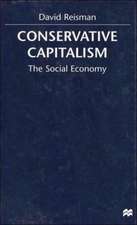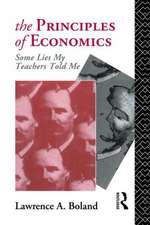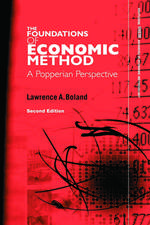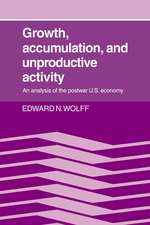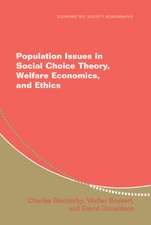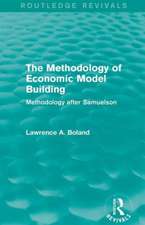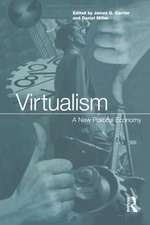Model Building in Economics: Its Purposes and Limitations
Autor Lawrence A. Bolanden Limba Engleză Hardback – 14 sep 2014
| Toate formatele și edițiile | Preț | Express |
|---|---|---|
| Paperback (1) | 268.13 lei 6-8 săpt. | |
| Cambridge University Press – 14 sep 2014 | 268.13 lei 6-8 săpt. | |
| Hardback (1) | 697.80 lei 6-8 săpt. | |
| Cambridge University Press – 14 sep 2014 | 697.80 lei 6-8 săpt. |
Preț: 697.80 lei
Preț vechi: 811.40 lei
-14% Nou
Puncte Express: 1047
Preț estimativ în valută:
133.57€ • 145.13$ • 112.27£
133.57€ • 145.13$ • 112.27£
Carte tipărită la comandă
Livrare economică 21 aprilie-05 mai
Preluare comenzi: 021 569.72.76
Specificații
ISBN-13: 9781107032941
ISBN-10: 1107032946
Pagini: 298
Ilustrații: 2 b/w illus. 3 tables
Dimensiuni: 150 x 231 x 23 mm
Greutate: 0.52 kg
Ediția:New.
Editura: Cambridge University Press
Colecția Cambridge University Press
Locul publicării:New York, United States
ISBN-10: 1107032946
Pagini: 298
Ilustrații: 2 b/w illus. 3 tables
Dimensiuni: 150 x 231 x 23 mm
Greutate: 0.52 kg
Ediția:New.
Editura: Cambridge University Press
Colecția Cambridge University Press
Locul publicării:New York, United States
Cuprins
1. Microeconomic vs macroeconomic in theoretical model building; 2. On the limitations of equilibrium models in general; 3. On building theoretical models using game theory; 4. On the purpose and limitations of game-theoretic models; 5. Microeconomic vs macroeconomic in empirical model building; 6. On building macroeconometric models; 7. Modeling and forecasting; 8. On the role and limitations of experimental and behavioral economics; 9. The logical adequacy of convincing tests of models using empirical data; 10. The statistical adequacy of convincing tests of models using empirical data; 11. Model building from a philosophy of science perspective; 12. Choosing model-building methods.
Recenzii
'The common practices of macroeconomists, like those of other tribes, look different when seen from inside or outside. Outsiders may see or take seriously things that insiders overlook because they seem part of the landscape. Professor Boland is an attentive and reflective outsider. I recommend especially his thoughts on the importance of defensibly realistic assumptions in macro model building. You will find other insights if you look.' Robert Solow, Professor Emeritus, Massachusetts Institute of Technology
'As the title suggests, Boland's new book is concerned with model building in economics: the nature of theories and models, the modeling process, the appraisal of models, and the use of models to test theoretical explanations against data. The author raises serious questions about the practices of model building and the problems faced by modelers, including the assumptions and judgments involved in constructing and validating economic models. The book will be of interest, not only to model builders, applied econometricians and people interested in economic methodology, but also to anybody interested in the foundations of economics as a scientific discipline, in general, and in the credibility of its theoretical and empirical underpinnings, in particular.' Aris Spanos, Wilson E. Schmidt Professor of Economics, Virginia Tech
'Models in economics are marvellous helpers but indifferent masters. Models become our masters when we fawn over them and take them literally and impose ill-fitting theoretical straightjackets on what we observe and on the interventions that we recommend. This timely book offers the insights and wisdom of Lawrence Boland regarding the changing role of models in the formation of knowledge and opinion in economics. The scope is historically and intellectually broad, with plenty to amuse and arouse readers. Among other observations, Boland argues that there is a generational gap in model building, and younger economists especially are encouraged to explore this book.' Edward Leamer, University of California, Los Angeles
'As with his earlier insightful books on methodology, Larry Boland clearly and comprehensively dissects model building in all its guises of theory, computer representations, lab and field experiments, and empirical (econometric) studies. This new contribution is filled with both pithy comments and deep analyses, highlighting the limits of many approaches currently in vogue.' Sir David F. Hendry, Oxford Martin School, University of Oxford
'The book's breadth of scope is breathtaking and it is a treasure trove of useful references for further pursuing more specific questions.' Erasmus Journal for Philosophy and Economics
'As the title suggests, Boland's new book is concerned with model building in economics: the nature of theories and models, the modeling process, the appraisal of models, and the use of models to test theoretical explanations against data. The author raises serious questions about the practices of model building and the problems faced by modelers, including the assumptions and judgments involved in constructing and validating economic models. The book will be of interest, not only to model builders, applied econometricians and people interested in economic methodology, but also to anybody interested in the foundations of economics as a scientific discipline, in general, and in the credibility of its theoretical and empirical underpinnings, in particular.' Aris Spanos, Wilson E. Schmidt Professor of Economics, Virginia Tech
'Models in economics are marvellous helpers but indifferent masters. Models become our masters when we fawn over them and take them literally and impose ill-fitting theoretical straightjackets on what we observe and on the interventions that we recommend. This timely book offers the insights and wisdom of Lawrence Boland regarding the changing role of models in the formation of knowledge and opinion in economics. The scope is historically and intellectually broad, with plenty to amuse and arouse readers. Among other observations, Boland argues that there is a generational gap in model building, and younger economists especially are encouraged to explore this book.' Edward Leamer, University of California, Los Angeles
'As with his earlier insightful books on methodology, Larry Boland clearly and comprehensively dissects model building in all its guises of theory, computer representations, lab and field experiments, and empirical (econometric) studies. This new contribution is filled with both pithy comments and deep analyses, highlighting the limits of many approaches currently in vogue.' Sir David F. Hendry, Oxford Martin School, University of Oxford
'The book's breadth of scope is breathtaking and it is a treasure trove of useful references for further pursuing more specific questions.' Erasmus Journal for Philosophy and Economics
Notă biografică
Descriere
Beginning with the practices of and the problems faced by model builders, this book discusses the modeling process and the testing of models.


